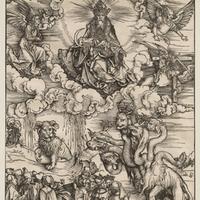Halloween Origins 3 of 8: Halloween Comes to America
Halloween Orígenes 3 de 8: Halloween llega a América
Origens do Dia das Bruxas 3 de 8: O Dia das Bruxas chega à América
Cadılar Bayramı Kökenleri 3 / 8: Cadılar Bayramı Amerika'ya Geliyor
萬聖節起源 3 of 8:萬聖節來到美國
Halloween is an annual holiday celebrated each year on October 31, and Halloween 2018 occurs on Wednesday, October 31.
It originated with the ancient Celtic festival of Samhain, when people would light bonfires and wear costumes to ward off ghosts.
In the eighth century, Pope Gregory III designated November 1 as a time to honor all saints; soon, All Saints Day incorporated some of the traditions of Samhain.
||||||||||||||||||||结合||||||
The evening before was known as All Hallows Eve, and later Halloween.
Over time, Halloween evolved into a day of activities like trick-or-treating, carving jack-o-lanterns, festive gatherings, donning costumes and eating sweet treats.
Halloween Comes to North America: Celebration of Halloween was extremely limited in colonial New England because of the rigid Protestant belief systems there.
|||||||||очень||||||||||||системы|
||||||||||||||||||||||allí
||||||||||||||||||sztywnych||||
|||América do Norte||||||muito limitada|restrita||colonial||Inglaterra colonial|por causa de|||rígidas|protestante|crença|sistemas de crença|
||||||||||||||||||严格的||||
Halloween was much more common in the southern colonies.
|||||||południowych|koloniach
|||||||sulista|as colônias
Хэллоуин был гораздо более распространен на южных колониях.
As the beliefs and customs of different European ethnic groups as well as the North American indigenous peoples meshed, a distinctly North American version of Halloween began to emerge.
||||||||этнических||||||||||переплетались||||||||||
||crenças||costumes e tradições||||étnica|grupos étnicos||||||norte-americana||os povos|se entrelaçaram||de forma distinta|||versão norte-americana|||||
||||||||||||||||||verflochten||||||||||entstehen
||||||||||||||||土著||交融||||||||||
||||||||||||||||rdzenne||zespoliły||wyraźnie||||||||pojawiać się
||||||||||||||||||se entrelazaron||||||||||
Сливаясь верованиям и обычаям различных европейских этнических групп, а также коренных народов Северной Америки, начала формироваться отчетливая североамериканская версия Хэллоуина.
The first celebrations included “play parties,” public events held to celebrate the harvest, where neighbors would share stories of the dead, tell each other's fortunes, dance and sing.
||||||||проводились|||||||||||||||||||
||||||||||||||||||||||||wróżby|||
||||||||||||cosecha|||||||||||||||
||celebrações|incluíam|brincadeiras|festas||eventos|realizadas||celebrar||||vizinhos||compartilhar|histórias||||||||dançar||cantar
Первая празднование включали «игровые вечеринки», публичные мероприятия, проводимые для празднования урожая, где соседи делились историями о мертвых, гадали друг другу, танцевали и пели.
Colonial Halloween festivities also featured the telling of ghost stories and mischief-making of all kinds.
||празднования|||||||||||||
|||||||||||Unfug||||
|||||||||||psotki||||
||festividades de Halloween||incluíram||narração||fantasmas|||travessuras||||
||||包括|||||||恶作剧||||
Колониальные Хэллоуинские празднования также включали в себя рассказы о призраках и шалости всевозможного рода.
By the middle of the nineteenth century, annual autumn festivities were common, but Halloween was not yet celebrated everywhere in the country.
|||||девятнадцатого||||||||Хэллоуин||||||||
|||||décima nona|||outono||||||||ainda não||em todo o país|||o país
К середине девятнадцатого века ежегодные осенние праздники стали обычным делом, но Хэллоуин еще не отмечался повсеместно в стране.
In the second half of the nineteenth century, North America was flooded with new immigrants.
||||||девятнадцатом||||||||
|||||||||||inundada|||
|||metade||||||||inundada de|||imigrantes
Во второй половине девятнадцатого века Северная Америка была переполнена новыми иммигрантами.
These new immigrants, especially the millions of Irish fleeing the Irish Potato Famine, helped to popularize the celebration of Halloween nationally.
||||||||逃离|||||||普及|||||
||||||||||||Hungersnot|||verbreiten|||||
||||||||uciekających|(2) Wielkiej|||Głód||||||||
|||||milhões||irlandeses|fugindo de|||batata irlandesa|fome da batata|ajudaram a||popularizaram|||||em todo o país
|||||||||||||||популяризировать|||||

